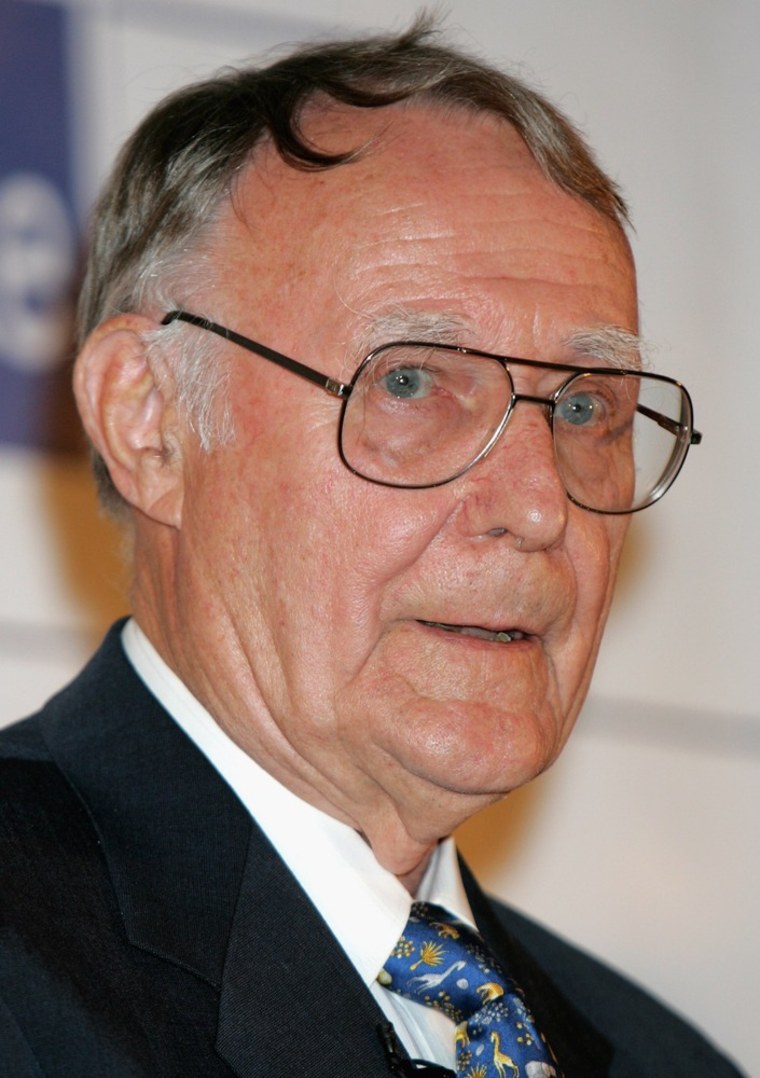A new book claims IKEA founder Ingvar Kamprad's youth ties with Nazi groups extended beyond what he has previously admitted, saying Sweden's intelligence agency even set up a special file on him.
Respected Swedish author and journalist Elisabeth Asbrink says Kamprad joined the Swedish Nazi party in 1943 when he was 17, prompting the security police to set up a file on him the same year.
Asbrink also claims in her book, "And in Wienerwald the Trees Remain," that the Swedish furniture chain founder was in contact with Nazi sympathizers until at least 1950 — two years longer than he had previously acknowledged.
She writes that Kamprad's letters were secretly opened by the security police, and their contents, including information about his effort to recruit new members, were noted on his file, in which the police wrote the word Nazi. "They were steamed open, copied, and closed again," Asbrink writes in the book.
Kamprad in the intercepted letters enthuses about recruiting new members and says that he "misses no opportunity to work for the movement," the Telegraph of London reported.
The intelligence agency is also quoted as having noted that Kamprad "had some sort of functionary position" in a youth Nazi organization that sent him newsletters.
Asbrink accused Kamprad of failing to come clean about the full extent of his Nazi past, the Telegraph said.
"He said in 1998 that he would get everything up on the table and that there would be nothing hidden," Abrink said, according to the Telegraph. "Why then didn't he tell us that he was a member of the worst Nazi party, and that the police found it serious enough to create a file on him?"
Per Heggenes, a spokesman for the IKEA icon, on Wednesday told The Associated Press that Kamprad had never been aware of the file's existence until now, and reiterated that Kamprad sees his Nazi involvement as the "biggest mistake" of his life.
"There are no Nazi-sympathizing thoughts in Ingvar's head whatsoever," Heggenes said.
A Kamprad spokesman told the Telegraph that the revelations were "old news."
"Ingvar Kamprad gave a detailed account back in 1994 about what he describes as his 'youthful sins' and the 'biggest mistake of his life', apologizing and asking for forgiveness from all parties involved. The IKEA he created is based on democratic principles and embraces a multicultural society."
The Swedish intelligence service refused to comment on the book's content and referred calls regarding the documents to the national archives. Calls to national archives went unanswered.
Based on a dozen interviews, official documents and more than 500 letters, the book recounts the true story of one of Kamprad's best friends, Otto Ullmann, an Austrian Jew sent to Sweden as a young boy just before the outbreak of World War II.
While he worked for the Kamprad family in 1944, Ullmann's parents were killed by Nazis in Germany. He learned about their deaths two years later.
Ullman played a key role in launching IKEA, Asbrink's book says, according to the Telegraph.
The book also mentions a wedding invitation Kamprad sent to a renown Fascist, Per Engdahl, in 1950, in which he underscored how proud he was that the two belonged to the same circle.
In 1988, Kamprad admitted his past involvement with Nazism in a book about his life and asked for forgiveness for his "stupidity." He also admitted to Swedish media that he had attended meetings of Nazi groups between 1945-48.
Kamprad has attributed his early sympathies to Nazism to his upbringing, saying he was greatly influenced by his grandmother, a native of the current Czech Republic region of Bohemia, who introduced him to Nazi propaganda magazines at an early age.
In a statement, The American Gathering of Jewish Holocaust Survivors and Their Descendants demanded that a probe be opened into Kamprad's past.
"Holocaust survivors are shocked at the reports of the depths of Kamprad's Nazi involvement which he previously had dismissed as mere 'teenage confusion'," it said. "It is time for Kamprad to come clean. Swedish intelligence files describe his recruitment of others to the fascist movement and his involvement with it well after World War II. This can hardly be characterized as youthful confusion."
